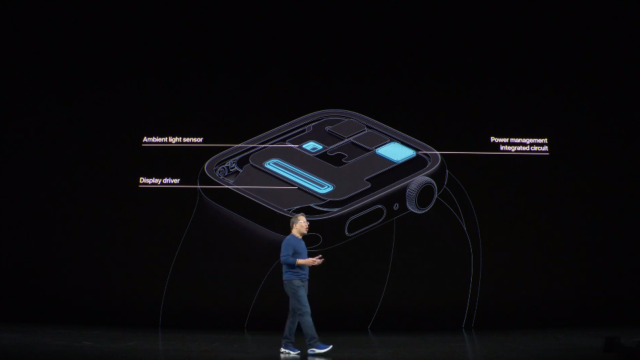Last week we got a glimpse at the Apple Watch Series 5. While it boasts a new LTPO screen and some software updates, one thing that hasn’t changed is its 18-hour, “all-day” battery life.
It’s an omission I noted in my initial Series 5 writeup, and one that earned scoffs from plenty of Apple Watch users in the comments.
Some noted their Apple Watches regularly outlasted the 18-hour estimate, even with GPS-heavy exercise tracking. A few commenters noted they easily got around 48 hours on a single charge. Others said multi-day battery life didn’t matter as the watch rapidly charges.
In the U.S. Gizmodo office, some frequent Apple Watch users noted that they too did not care because a solid day of use was more than enough. Others noted the comparatively short battery life is the main reason why they will never shell out for one.
This nonchalance from Apple Watch fans is somewhat surprising. Other competitors, like Fitbit and Garmin, emphasise how much battery life you can get between charges. Fitbit’s Versa 2 for instance got 7 days in testing. That lengthy battery life enables popular features like native sleep tracking — a feature that was heavily rumoured for the Series 5, but ultimately didn’t come to pass.
The other benefit is you’re more likely to stick with a wearable the longer the battery life. The more times you take it off to charge, the more likely it ends up collecting dust in your drawer.
So, is it that Apple would rather prioritise new features over battery life… or does it do so because it knows the fans have learned to embrace nightly charging? Do Apple fans know that while, yes, the watch rapidly charges, there is also a life where you don’t have to strategise your routine around charging? Is this a form of gadget Stockholm Syndrome? Does it truly not matter?
It’s curious, given that Android users routinely blast WearOS watches for only lasting a day and improved battery life was a big benefit of the Snapdragon Wear 3100 chipset. Long battery life is something other wearables makers cite at events as one of their most frequently requested features.
Personally, I’ve spent long swaths of time with the Apple Watch Series 2-4, and the longest I’ve gotten is roughly 36 hours. That goes up and down depending on new features and how many apps I’m using (Spoiler: I use a lot and check my Activity Rings obsessively.)
I’ve also been frustrated a handful of times where I’ve forgotten to charge the watch and ended up with a dead device and unclosed rings. That happens much less frequently with say, the Fitbit Versa 2. By the time I notice I’m down to 25 per cent battery, I know that’s going to last me at least another 6 to 8 hours, sometimes longer. Conversely, if I’m down to 20 per cent on my Apple Watch Series 5 in the early afternoon, it’s probably not to make it the rest of the day.
Clearly, Apple doesn’t need to lengthen battery life for the watches to sell. I’m just saying if it did, its dominance would be complete — with the exception of Android users. But for now, we’ll just have to wait and see how much power that always-on display uses up on the Series 5.
